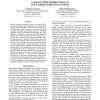Free Online Productivity Tools
i2Speak
i2Symbol
i2OCR
iTex2Img
iWeb2Print
iWeb2Shot
i2Type
iPdf2Split
iPdf2Merge
i2Bopomofo
i2Arabic
i2Style
i2Image
i2PDF
iLatex2Rtf
Sci2ools
117
click to vote
AAAI
2007
2007
Acquiring Visibly Intelligent Behavior with Example-Guided Neuroevolution
Much of artificial intelligence research is focused on devising optimal solutions for challenging and well-defined but highly constrained problems. However, as we begin creating autonomous agents to operate in the rich environments of modern videogames and computer simulations, it becomes important to devise agent behaviors that display the visible attributes of intelligence, rather than simply performing optimally. Such visibly intelligent behavior is difficult to specify with rules or characterize in terms of quantifiable objective functions, but it is possible to utilize human intuitions to directly guide a learning system toward the desired sorts of behavior. Policy induction from human-generated examples is a promising approach to training such agents. In this paper, such a method is developed and tested using Lamarckian neuroevolution. Artificial neural networks are evolved to control autonomous agents in a strategy game. The evolution is guided by human-generated examples ...
AAAI 2007 | Autonomous Agents | Human-generated Examples | Intelligent Agents | Intelligent Behavior |
| Added | 02 Oct 2010 |
| Updated | 02 Oct 2010 |
| Type | Conference |
| Year | 2007 |
| Where | AAAI |
| Authors | Bobby D. Bryant, Risto Miikkulainen |
Comments (0)

